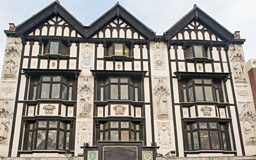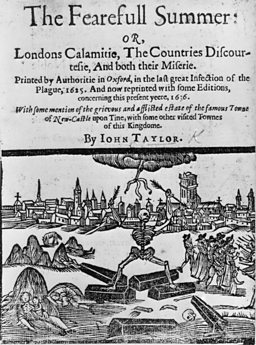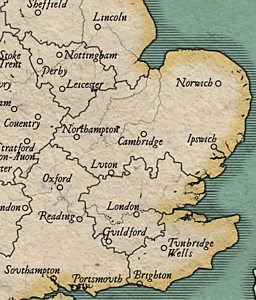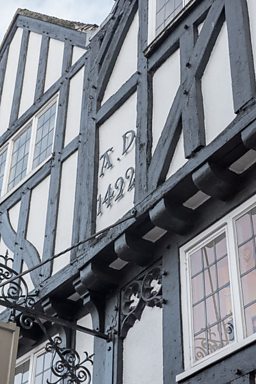Shakespeare's Players turned away from Kingston-upon-Thames
Almost a decade after Shakespeare’s death, his players The King’s Men appeared in Kingston-upon-Thames only to be turned away by the town authorities.
In fact, records show that the actors were paid not to perform not once but TWICE between 1624 and 1627.
-
![]()
Much ado near me
Hear more Shakespeare stories on BBC Radio London
-
![]()
Shakespeare Festival 2016
The BBC celebrates the genius of the bard

The entry recorded in the town chamberlain’s account is a stern one: ‘Item given to the Kinges players because they should nott play in the Towne Hall nor in the Towne for the space of ffyve yeares x s.’
Kingston - as well as London -- was suffering from a severe plague in 1625, so the dismissal of players may have been determined by concern for public health rather than local puritan attitudes.
The company was not easily discouraged, however, as they appeared soon thereafter, in 1626-7, only to be paid once again ‘to forbear to play in the Towne x s.’

A decade later they made a final attempt, in 1633-4, and were once again rewarded with 10 shillings though it is not clear whether an exception was made this one time to allow performance by the usually hostile town authorities who were unafraid to turn away royal troupes during this period.
Although they may not have actually performed in the town, the timber-framed Tudor town hall in Kingston’s marketplace was named as a space to be protected from unwanted entertainments. The hall had been built in 1505 but was demolished in 1840. The present Market House, a handsome Grade II* listed building, replaced it on the same site.
Not dead 30 years - and signs that Shakespeare’s reputation is starting to fade?
In a 1640 edition of Shakespeare's poems, Leonard Digges (a 17th-century poet) provides a celebratory poem to the opening of the book, in which he praises Shakespeare at the expense of other playwrights.
He says that the King's Men remain the supreme London company because of Shakespeare's plays, and advises other playwrights to sell their works to other companies instead.
He writes that even Ben Jonson's plays are not well attended at the Blackfriars, but that Shakespeare's plays still fill the galleries and boxes.
Tanya Hagen, Bibliographer, REED writes: "Let’s assume that Digges is being a bit hyperbolic here: it is, after all, a commendatory verse prefatory to a volume of poems which presumably the printer/publisher wants to sell, so it’s in everybody’s best interest to make Shakespeare look as good as possible.
Digges suggests here that playwrights need not bother trying to sell their work to the King’s Men, but should peddle their plays to the less distinguished companies at the Red Bull, Cockpit/Phœnix and Fortune.
But he is factually wrong when he says that Shakespeare’s plays continue to make the King’s Men the premiere London company.
At this juncture, Beaumont and Fletcher are a massive popular phenomenon; by comparison, Shakespeare’s reputation is definitely on the wane.
Shakespeare never entirely disappears from the public consciousness, but it is not until the eighteenth century that we see a clear ascendancy over his contemporaries in the popular imagination.
At least some of this has to do with the publication circumstances of his plays during the early c18th, and with certain regulatory aspects of the early- to mid-c18th theatre, which made it prudent to build a season on revivals of ‘old plays,’ rather than investing in new works.
In ongoing squabbles between Royalist and Puritan interest, moreover, the early theatre became a symbol of English nationalism; to be loyal to the throne was to celebrate the theatre as a unique manifestation of Englishness.
Shakespeare became a convenient figurehead for that interest."

Shakespeare on Tour
From the moment they were written through to the present day, Shakespeare’s plays have continued to enthral and inspire audiences. They’ve been performed in venues big and small – including inns, private houses and emerging provincial theatres.

BBC English Regions is building a digital picture which tracks some of the many iconic moments across the country as we follow the ‘explosion’ in the performance of The Bard’s plays, from his own lifetime to recent times.
Drawing on fascinating new research from Records of Early English Drama (REED), plus the British Library's extensive collection of playbills, as well as expertise from De Montfort University and the Arts and Humanities Research Council, Shakespeare on Tour is a unique timeline of iconic moments of those performances, starting with his own troupe of actors, to highlights from more recent times. Listen out for stories on Shakespeare’s legacy on your BBC Local Radio station from Monday 21 March, 2016.
You never know - you might find evidence of Shakespeare’s footsteps close to home…
Craig Henderson, BBC English Regions
Protecting the profitability of Shakespeare's plays a decade after his death
In April 1627, eleven years after Shakespeare’s death, we see evidence of those close to Shakespeare - and his financial earnings – seeking to protect their livelihoods.
Records show that John Heminges, a powerful figure in Shakespeare’s King’s Men at the time pays £5, in the name of the King's company, to forbid the performance of Shakespeare's plays by another performing group - the Red Bull company.
Tanya Hagen, Bibliographer, REED, writes: “This indicates the posthumous popularity, and profitability, of Shakespeare’s plays.
“Heminges does not have the power of veto, but Sir Henry Herbert, as Master of Revels, does, and Heminges is paying him a reasonably hefty £5 to forbid a rival company from performing the play.
“Heminges is a major figure in the King’s Men at this point in time, and he is one of the people, along with Henry Condell, behind the famous preface to Shakespeare’s 1623 folio. Heminges has an interest in preventing the Red Bull company from performing one of the repertory’s plays not only because the King’s Men may still want to use it themselves, but because it’s been published fairly recently in a big expensive books in which he has a proprietary interest.”

-
![]()
Shakespeare Lives
The nation’s greatest performing arts institutions mark 400 years since the Bard's death
Related Links
Shakespeare on Tour: Around London
-
![]()
The King's Men
When Shakespeare's players became the King's men and join the 1604 Coronation procession
-
![]()
The 1809 ticket price riots
The most famous riots in the history of theatre
-
![]()
The Lyceum Theatre performed Shakespeare in 1883
But which famous gothic writer worked here?
-
![]()
Charles Kean
The London theatre manager not lost for words
-
![]()
A historic performance of Coriolanus in London
The last performance of Coriolanus before the French Revolution
-
![]()
London's Female Romeo
Charlotte Cushman, who took Victorian London by storm
-
![]()
Curtains for London's Newington Theatre
The closure of London's first purpose built theatre south of the Thames
-
![]()
Blossoming at the Rose theatre
The history of the Rose playhouse
-
![]()
Shakespeare and the 'Night of Errors'
A series of unfortunate incidents at Gray's Hall
Shakespeare on Tour: Around the country
-
![]()
Ipswich: a magnet for Shakespeare?
Why did Shakespeare's company visit Ipswich ten times?
-
![]()
Sarah Siddons visits Norwich
Putting the Theatre Royal, Norwich, on the map
-
![]()
Madame Tussaud's exhibiton in Nottingham
Including a model of William Shakespeare
-
![]()
Touring Kent to avoid the plague
In 1592, the plague forced touring theatre companies out of London
















